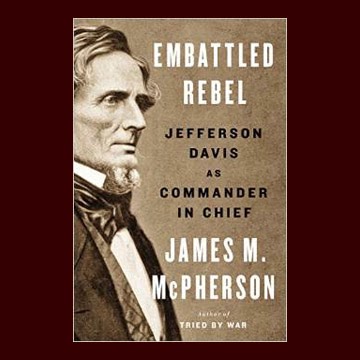EmbattledRebel: Jefferson Davis as Commander In Chief, James M. McPherson,
Penguin Press, 302pp., 24 black and white illustrations, 15 maps, bibliographic
notes, index, 2014, $32.95.
As president of the Confederacy, did Jefferson Davis prove
to be a decisive factor in bringing about its defeat? Did his work as
commander-in-chief contribute the defeat of the Confederacy? Is historian David
M. Potter correct in stating that if the
Union and the Confederacy had exchanged presidents, the Confederacy might have
won its independence? In Embattled Rebel James M. McPherson, an
academic scholar with over a dozen books and numerous articles to his credit,
avoids comparing Davis to Lincoln. McPherson describes and analyzes Davis’
conception and execution of his duties as commander in chief as he understood
them.
McPherson notes that negative depictions of Davis’
personality have been offered by his contemporaries in both the Confederate
government and military. These
depictions of Davis are adequately noted by William C. Davis in Jefferson Davis: The Man and His Hour
and An Honorable Defeat: The Last Days of
the Confederate Government. McPherson acknowledges that there is substance
to the claims that Jefferson Davis was impatient with others with whom he
disagreed and did not take personal criticisms well. More often than not, Davis could be humorless,
argumentative and cold to others.
The author does note that some found Davis to be attentive
and polite to others, as well as cordial and a good listener. McPherson believes that the Confederate
president’s ill-health health was the likely cause of apparently abusive
conduct. Symptoms of previous bouts with
malaria, severe neuralgia, and corneal ulcers left him at times in pain,
nauseous, and partially blind. Often
sick, Davis worked frequently from a sick bed at home. Bronchial infections,
insomnia and boils increased discomfort and pain.
McPherson notes that it was in April and May 1863, while
Lee
was suffering from symptoms of heart disease and Jackson was dying, that Davis
could not come to the presidential
office for reasons of sickness. Along with
his ill-health, the stress of having meager resources at hand to meet the
challenges of the presidency added to Davis’ irritability, impatience and short
temper.
With these caveats,
McPherson judges Davis on five activities: 1. national policies regarding war
aims, 2. national strategies regarding of the mobilization of political,
economic, diplomatic, and military resources, 3. military strategy to address
the war aims, 4. operations and management of the armies and their movements,
and 5. the military tactics of specific armies in specific battles.
 He finds that Davis’ shaping and articulation of national
polices to be clear and forceful regarding nationhood and slavery. McPherson makes
the case that Davis’ military efforts were conditioned by economic and European
situations beyond his control. Regarding the operations of the armies and
military tactics, McPherson describes the difficulties and behavioral conflict inherent
in Davis’ command style and those of several army commanders, who like Davis
could be apparently thin skinned regarding criticism and closed minded to
suggestions.
He finds that Davis’ shaping and articulation of national
polices to be clear and forceful regarding nationhood and slavery. McPherson makes
the case that Davis’ military efforts were conditioned by economic and European
situations beyond his control. Regarding the operations of the armies and
military tactics, McPherson describes the difficulties and behavioral conflict inherent
in Davis’ command style and those of several army commanders, who like Davis
could be apparently thin skinned regarding criticism and closed minded to
suggestions.
In Embattled Rebel:
Jefferson Davis as Commander In Chief, McPherson clearly understands that at the core of Davis’ difficulties lies not
only his ill-health but also his ‘offensive-defensive’ military strategy and
the strategies’ conflicts with the rights of the states to control their own
manpower and resources. For McPherson, Jefferson Davis should not be charged
with losing the war but that Lincoln won it by adeptly using resources,
embracing over time a successful military strategy, and building a team of
commanders that were not available to the Confederacy. Embattled
Rebel: Jefferson Davis as Commander In Chief is succinct and clearly
written. For those who have not read
biographies of Davis published in the last 30 years, Embattled Rebel is a very fine place to start.



No comments:
Post a Comment